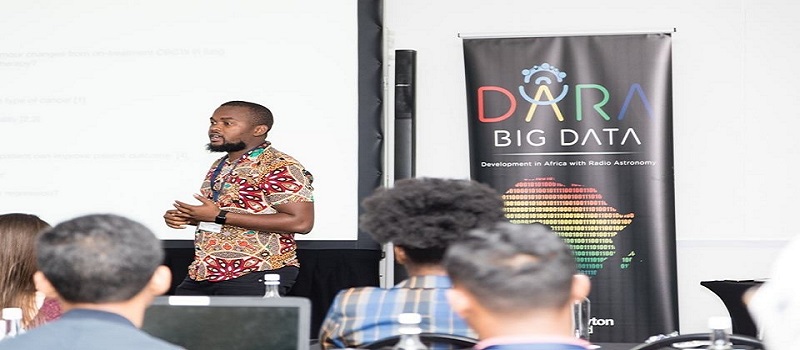DARA Big Data enables African students to participate in big data research - PDF Version
What is DARA Big Data?
Development in Africa with radio astronomy (DARA) Big Data is a Newton Fund project that aims to fund students from countries that are part of the African very long baseline interferometry network (AVN) to undertake research degrees that build skills in the field of data sciences. The AVN partner countries are: Botswana, Ghana, Kenya, Madagascar, Mauritius, Mozambique, Namibia and Zambia. Research areas focus on astrophysics, healthcare and sustainable agriculture. Over the last three years, students who have been sponsored by DARA Big Data have pursued masters and PhD degrees at several universities in the United Kingdom. Additionally, DARA Big Data hosts events across the AVN countries to help African students to participate fully in the fourth industrial revolution (4IR) and to benefit from the various opportunities that arise from the 4IR. The DARA Big Data project is led by Professor Anna Scaife at the University of Manchester, in conjunction with partner universities. For more information about DARA Big Data, click here.
Experience pursuing a PhD funded by DARA
As I was a PhD student who was funded by DARA Big Data, I participated as a tutor in workshops that were hosted across the AVN countries. I helped to facilitate hackathons and to lead a project on quantitative image-based analysis in healthcare at the Big Data Africa School. DARA Big Data provides students with networking opportunities through lectures, seminars and other events that they host. In return, the DARA-funded students bring knowledge and skills back into the wider African networks.
Exciting work in radiotherapy physics
Life as a PhD student in the advanced radiotherapy research (RTPhysics) group at the University of Manchester is exciting, fun and rewarding. My research involves the investigation of image-based data-mining methods to analyse how lung tumours change during treatment. The aim is to distinguish elastic and inelastic tumour changes. This information can be used to personalise treatment through the adaptation of radiotherapy. Personalised treatment will enable the delivery of better-targeted radiotherapy and reduce toxicity of the treatment to the tissue that surrounds the tumour. Besides routine research activities, as a PhD student in radiotherapy physics I participated in outreach activities. My highlight outreach activity was a project called Radiotherapy & Me, which enabled residents of Greater Manchester who had been treated with radiotherapy to tell their stories.

Lameck talks about his research at the Big Data Africa School 2019 in Cape Town, South Africa (photo credit: South African Radio Astronomy Observatory)

Lameck Mbangula Amugongo
RTPhysics group
University of Manchester
Manchester, UK
About the author
Lameck Mbangula Amugongo is a third-year PhD student in the RTPhysics group at the University of Manchester. He is working with Dr Eliana Vasquez Osorio, Dr Andrew Green, Dr David Cobben, Professor Marcel van Herk and Dr Alan McWilliam. As part of his PhD, he is researching novel techniques to identify modes of tumour regression to address the issue of when it is safe to adapt treatment margins. His PhD is funded through the DARA Big Data project. He obtained his bachelor's degree in software engineering and his master's degree in computer science at the Namibia University of Science and Technology.